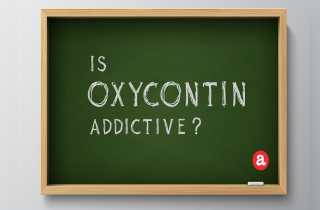Yes, OxyContin is addictive. In fact, the addiction liability of OxyContin is about the same as morphine. And OxyContin addiction stats indicate increasing addiction. So what’s in OxyContin that makes it so addictive? And when does Oxy use turn REALLY addictive? We explore here.
What’s in OxyContin?
OxyContin is the brand name for a pain medication which contains oxycodone. So actually, the main ingredient in OxyContin (oyxcodone) is addictive. So how does oxycodone work on the brain?
Oxycodone and the brain
Opioid drugs like oxycodone interact with the mu opioid receptors in the body, especially in the brain and spinal cord. When activated, these receptors bring on pain relief by interrupting the communication of nerve pain to the brain. However, the mu opioid receptors can also produce the euphoric state, a state of well-being that people chase when they get high. Plus, opioids like oxycodone elevate levels of the neurotransmitter dopamine in the brain pathways that control the experience of pleasure, so that the pleasure center of the brain gets a big dose of good feeling when you take OxyContin.
For these reasons, the DEA classifies OxyContin as a Schedule II controlled substance. This means that although there is a known medical use for OxyContin, abuse and addiction potential is relatively high. To put it another way, the only opiates more addictive than OxyContin are heroin and other strong pain killers no longer prescribed in the U.S.
What increases OxyContin addiction risk?
Some people are more at risk of becoming addicted to OxyContin than others. Specifically, your family history, intention and mode of administration of OxyContin contribute to addiction potential.
1. Family history – People at increased risk for opioid abuse are those with a personal or family history of substance abuse. So if addiction is in your family, including drug or alcohol abuse or alcoholism, your risk of getting addicted to OxyContin is higher than people who have no family history of addiction. Likewise, if mental illness such as major depression is in your family, your Oxy addiction potential is higher.
2. Intention – If you are using OxyContin to get high, you are at a high risk of becoming addicted to the pain reliever. It’s like people who are getting high on Suboxone. Even that softer drug is addictive, when used just to get high. Only OxyContin is way more risky. Also, if you are taking OxyContin without a prescription, you are at risk of becoming an OxyContin addict.
3. Mode of administration – OxyContin contains a much larger amount of oxycodone than most other prescription pain medications. So if you are taking OxyContin in higher doses, frequencies or in ways other than prescribed, you are at risk of opioid addiction. Oxycodone is very addictive, especially when chewed or snorted because the time release effect is broken. Oxycodone is even more addictive if the crushed formulation is made into a solution and injected. It is this high rate at which the drug gets to the brain, as well as the overall dose taken, that makes for a greater effect on the brain’s reward centers and the consequent chemical hijacking of those centers that we call addiction.
4. Personal medical history – People who have abused prescription medications in the past may have a higher chance of abusing or developing addiction again when prescribed OxyContin.
Drug addiction is a disease
Drug addiction is a disease and is nothing to be ashamed about. Physically, prolonged use of OxyContin eventually changes the brain in fundamental and long-lasting ways. This is why people cannot just stop taking OxyContin on their own and why treatment is needed. During drug addiction, drugs take over the brain’s normal pleasure and motivational systems, and place drug use at the highest priority in the motivational hierarchy. So, OxyContin addicts cannot “listen to” any other motivation or drive other than to take OxyContin. These brain changes are responsible for the compulsion to seek and use OxyContin in the brain disease that we have come to define as addiction.
Questions about Oxy addiction
If you think that you might have a problem with Oxy’s, you probably do. But you can get help. Residential addiction treatment centers or medications can help you live a more normal life. Please let us know how we can help you. We’ll answer your questions personally and maybe even write a new article just for you. Please leave your questions about Oxycontin addiction below.









Related Posts